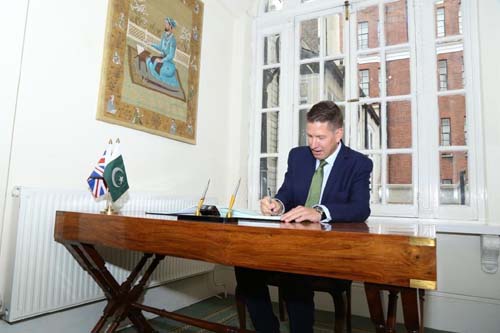
‘Education is the key to a better future for girls’
Newswire
Islamabad: Ahead of International Women’s Day this week, representatives from Government of Pakistan, the Girls’ Education Challenge, the British High Commission and ACTED Pakistan held a joint event in Islamabad to highlight challenges to girls’ education and viable approaches to address them.

In particular, the participants discussed negative impacts on women and girls during crises, especially due to climate change, fragility, conflict or any other form of emergencies such as the recent Covid-19 pandemic.

Annabel Gerry, Development Director, British High Commission Pakistan opened the event while highlighting priorities for the UK Government to support the cause of girls’ education across the globe and especially in Pakistan and the South Asia region.
She remarked: “During the UK’s G7 Presidency last year, we called for every girl to have 12 years of quality education. Since 2011, 10 million children in primary school and nearly 6 million in secondary school in Pakistan have benefited from UK support, around half of whom are girls. As I have visited schools and universities across Pakistan, I’ve been impressed by the talented and fearless female students I meet.”
Ian Attfield, GEC South Asia Regional Education Advisor at UKAID outlined the GEC approach to ‘Leave No Girl Behind’ and introduced GEC’s learning series on Fragility and Girls’ Education. Locally adapted solutions are needed to provide access to basic services, protection and safe learning spaces in crisis situation. Participants emphasized the importance of empowering girls through education and life skill development, developing linkages between communities and government stakeholders and for increasing national ownership, and prioritizing women empowerment at the grassroots level.
Attfield also thanked the GEC partners and participants and expressed his gratitude for the role of concerned Federal and Provincial Departments who have been ensuring sustainability and support, all along for successful implementation of the projects.
The project’s external evaluators team shared that: “Given the scale of out-of-school girls in Pakistan, ACTED and IRC are implementing an integrated education approach which aims to simultaneously address physical, quality-related, socio-cultural, community level, and system-level barriers to girls’ access to schooling or any other form of education.”
The Closing the Gap project which is funded by the UKAID GEC Leave No Girl Behind (LNGB) initiative in Sindh and Khyber Pakhtunkhwa, is being implemented to reach out to a total of 5,500 beneficiaries including 4,400 girls who have never been to school. Similarly the TEACH project in Balochistan implemented by IRC is catering to around 29,000 beneficiaries through vocational training, accelerated learning programme and radio lessons.
Further highlighting the project’s achievements in Sindh and KP, the evaluator shared that, “More than 1600 learners from districts Jacobabad and Kashmore have successfully completed the Literacy and Numeracy course and a total of 309 local teachers and coaches have been trained on interactive and play based teaching techniques. Similarly, more than 1100 learners from the Primary Level Accelerated Learning Programme are expected to graduate by the end of the year 2022 and mainstream into post primary education programmes. Shedding light on the increasing interest of the girls for attending learning centres, the evaluator shared that more than 90% of the girls attend learning centres regularly every month and have thus significantly improved their performance.” He also added, “To ensure that girls’ education is prioritized by the communities, more than 2,000 local communities through 215 learning space committees, have been sensitized on girls and women safeguarding, gender equality, and social inclusion (GESI) under GEC programme in KP and Sindh.
Representatives from Street Child participated virtually from Nepal, and shared lessons learnt and approaches to support girls’ transition pathways and learning in times of crisis from the intervention in Nepal.
Street Child implemented “Marginalized No More” program from 2018-2022, targeted to support Musahar girls aged 10 to 19 at Madesh Province and Province 1 of Nepal. Considered as the “lowest of the low” within the caste system, a synthesis of indicators on social status, ranks the Musahars at the lowest on multiple indicators. They are highly vulnerable to the annual flooding in these regions which is worsened by the climate crisis. They are regularly displaced further deepening their marginalization. Musahar girls bear the brunt of this burden. Exclusion from education, and in turn, exclusion from employment drives them into deep destitution and debt bondage.
The key note speaker at the event was Nafeesa Inayatullah Khan Khattak, Member of the National Assembly of Pakistan and the Child Rights Committee at the National Parliamentary SDGs Taskforce.
She highlighted how the Parliamentary SDG Task Force is prioritizing children’s rights and specially right of education. She emphasized that education is current government’s priority and several initiatives have been launched to address the challenge of out of school children. Other speakers and participants included, Waseem Ajmal Chaudhary- Joint Secretary- International Coordination from the Federal Directorate of Education and representatives from the World Bank, JICA, UNICEF, Aga Khan Foundation-Education, and Provincial Education Department. International development organizations and civil society actors included Right to Play, VSO, NCHD, ITA, and IRC, also participated in the event to exchange information and their experiences from the similar programmes for strengthening girls’ education across the country.
She appreciated all the partners for sharing the details of their projects. She further highlighted that such learning and research based knowledge exchange series of dialogue should continue as they help build consensus around the need of non-formal education for girls from the extremely remote or fragile contexts and also help identify successful approaches to accelerated learning programmes.
The UK’s flagship GEC is the world’s largest programme dedicated to girls’ education. Through the Girls’ Education Challenge programme, the UK is helping more than 1.5 million girls across 17 countries to access learning opportunities.
